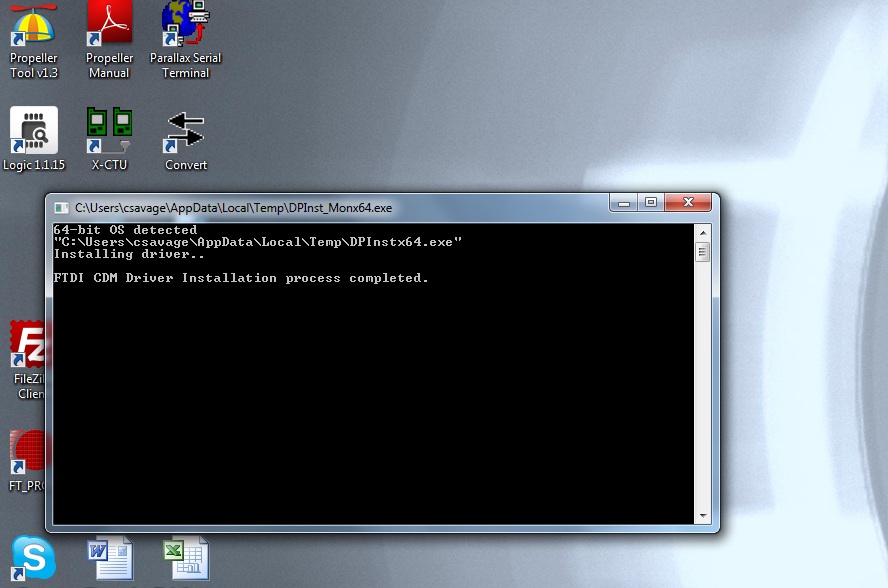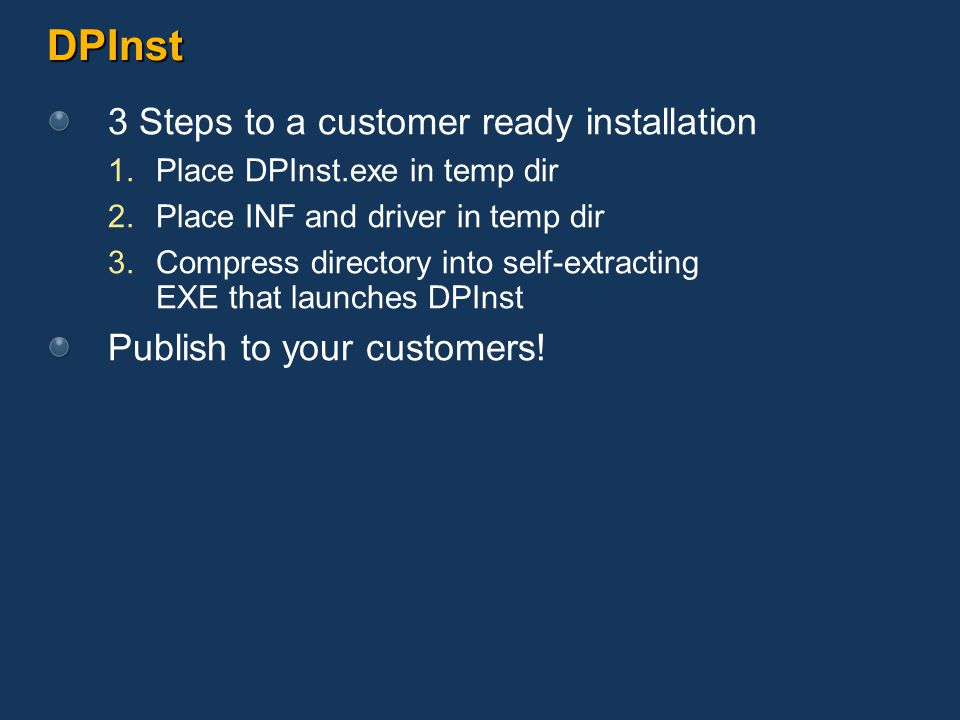
- #64 bit dpinst install#
- #64 bit dpinst serial#
- #64 bit dpinst drivers#
- #64 bit dpinst update#
- #64 bit dpinst driver#
If I directly connect the EVB to the my laptop (Lenovo Thinkpad) via USB cable **only** I "may" run into the issue described above (I am saying "may" because this evening I don't see the problem with a direct connection like on Friday, it is intermittent). I think this issue is solved, I am suspecting the USB power supply in Windows. In the meantime I am using the download via JTAG.

#64 bit dpinst install#
I will try to install the environment in Linux with VM and see the result.
#64 bit dpinst driver#
There is also something fishy with the FTDI driver that I could not figure out yet. I still believer we should have a dpinst for 圆4 platform in the official release of the SDK. Last test was to plug the JTAG/Segger J-Link and I was able to build the application, load the target via JTAG and execute. I am using FTDI driver for the BLE development with the WICED Smart SDK on the same machine, not sure if it would create some type of clash between drivers. Libusb-win32(libusb0) WICED Eval Board ( 1.2.5.0)įTDI CDM Driver Package - Bus/D2XX Driver ( 2.08.14)įDTI CDM Driver Package - VCP Driver ( 2.08.14) The driver names displayed by the dpinst (圆4) are the following:
#64 bit dpinst update#
The installer is telling me: "The device driver installation wizard did not update any of your software for your hardware devices because it was not better than the software you currently have installed" I still gave a shot and used a dpinst (圆4) stored on my computer (the one provided by Segger), I attached what I saw: I thought dpinst was very specific for this type of installation and it cannot be exchanged randomly. I tried to run the dpinst and I got the well documented problem where the pop up windows is asking me to run the 圆4 version. WICED-SDK-3.1.1\WICED-SDK\tools\drivers\BCM9WCD1EVAL1_Drivers The FTDI device is not found, so more investigation got me to the following folder. In procedure 'init' called at file "./WICED-SDK/tools/OpenOCD/stm32f2x-flash-app.cfg", line 10 WICED-SDK/tools/OpenOCD/stm32f2x-flash-app.cfg:10: Warn : target name is deprecated use: 'cortex_m'Įrror: unable to open ftdi device: device not found Trst_and_srst separate srst_nogate trst_push_pull srst_push_pull connect_assert_srst Info : only one transport option autoselect 'jtag' WICED-SDK/tools/OpenOCD/stm32f2x-flash-app.cfg -c "verify_image_checksum build/waf_bootloader-NoOS-NoNS-BCM943362WCD4-SDIO/binary/waf_" WICED-SDK/tools/OpenOCD/stm32f2x.cfg -f. WICED-SDK/tools/OpenOCD/BCM9WCD1EVAL1.cfg -f. WICED-SDK/tools/OpenOCD/Win32/openocd-all-brcm-libftdi.exe -f. The command line is displayed below as well as the error message: I drilled into the makefile to execute again the same command that provided the error message via Cygwin (usually a good approach to have more information). My machine is a Lenovo 64bits running Windows 7.
#64 bit dpinst serial#
Under Port (COM & LPT): WICED USB Serial Port (COM26)īelow Universal Serial Bus controllers I see: WICED USB JTAG Devices.

If I looked at the Windows Device manager I would see the following (everything looks good): Check that you have the correct target and JTAG device plugged in. Check in the task list that another OpenOCD process is not running. In a virtual machine it may be due to USB passthrough settings.
#64 bit dpinst drivers#
"**** OpenOCD failed - ensure you have installed the driver from the drivers directory, and that the debugger is not running **** In Linux this may be due to USB access permissions. This is the same error that is documented throughout the forum.

Note (if you don't want to read the rest of this post): I am able to bypass the problem if I plug a Segger J-Link and download my app over JTAG.Īfter building the application I ran into this issue with the message in the console window launching snip.scan-BCM943362WCD4 download run. So I would be able to get UART traces and FTDI debug as well (same way as described in the official video and QS documentation). My expectation was to be able to run the application connecting the Broadcom EVB (ref: BCM9WCD1EVAL1, mounted with BCM943362WCD4) and my computer via **a single USB cable**, without j-link debugging tool.


 0 kommentar(er)
0 kommentar(er)
